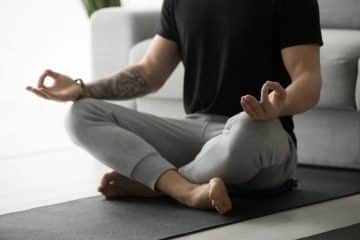Good night's sleep is as critical to your health as daily exercise and a balanced diet. Evidence indicates that poor sleep has direct detrimental impacts on your metabolism, fitness, and cognitive function. Studies also suggest that poor sleep quality can induce weight gain and raise the likelihood of illness in both adults and children. Healthy sleep, on the other hand, can balance out your appetite and boost your motivation levels to workout more.
For the average person, trying to incorporate any amount of sleep-promoting techniques may be daunting, as most of them can be very challenging to implement. However, it's imperative to note that changing your sleep habits doesn't have to be an all-or-nothing situation. You can initiate with minor adjustments and work your way up to more far-reaching changes that ultimately better your nightly sleeping patterns.
Using this guide, we’ll walk you through how to improve your sleep quality in three easy steps.
Step 1: Create a sleep-friendly space
One of the most helpful suggestions to help you fall asleep quickly and efficiently is to make your bedroom a site dedicated to genuine rest and relaxation. Although this may seem abundantly clear, comfortability is oftentimes overlooked, solely adding to the running list of difficulties of getting quality sleep night after night. You read that right, there’s a lot more you can do for your sleepytime self than wearing a night guard!
When updating the comfort levels in your bedroom keep these tips in mind:
- Upgrade your mattress: A high-quality mattress is absolutely necessary to ensure sure you're relaxed enough to sleep. A good mattress can best ensure that your back is adequately supported to prevent any consequential discomfort.
- Upgrade your bedding: Your sheets and blankets play a vital role in making your bed feel comfortable. Swap out your current bedding for bedding that is soft to the touch.
- Moderate noise levels: Keeping sound disruption to a minimal level is a vital aspect of creating a sleep-positive space. If you're unable to remove external sources of noise, try blocking them with a fan or a white noise machine. If you're looking for a more affordable investment, earplugs are another genius way to prevent sounds from disturbing your sleep cycle.
- Fix the thermostat: You don't want the temperature in your bedroom to be too hot or too cold. According to the Sleep Foundation, the ideal temperature for sleeping varies per person, but most evidence supports that a temperature around 65 degrees is best.
Step 2: Exercise regularly
Physical exercise is a healthy way to ensure you're able to get a decent night's sleep. Better still, it's incredibly important to squeeze consistent exercise into your everyday routine. Dedicating at least 30 minutes to working out is a great way to make sure you're doing both your mind and body a great deal of good for the short-term and long-term.
When you engage in aerobic workouts, you release endorphins that maximize energy levels. When the endorphins are balanced out, you become exhausted, which is why working out at least two to three hours before bedtime is such a fantastic idea.
 So, which exercises are best for sleeping?
So, which exercises are best for sleeping?
Step 3: Practice mindfulness
Not only does meditation offer you the peace and calm from your daily hustle and bustle, but it can also stimulate the supply of oxygen flowing to your brain. Serving to reduce stress, strengthen your immune system, and enhance your overall mental health, practicing meditation helps to soothe and reset your mind every time you do it.
There are a plethora of science-based therapeutic mediation techniques that can help you find your balance before bed to ease your mind and body to sleep. But with regularly scheduled 10-20 minute meditation sessions, you can lead yourself down the road to harmony.
Do a bit of research before getting started. There are a number of amazing meditation methods out there, and finding the best one for you might take a bit of trial and error. Check out these popular meditation types:
- Chakra meditation
- Insight meditation
- Zen meditation
- Qigong meditation
- Mantra meditation
- Unguided meditation
- Transcendental meditation
Wrapping up
Improving your sleep quality may be a challenge, but with the right method driving your sleep hygiene, you can free yourself from endless nights of tossing and turning. Let us know in the comments below which of these steps you’re most eager to try!



